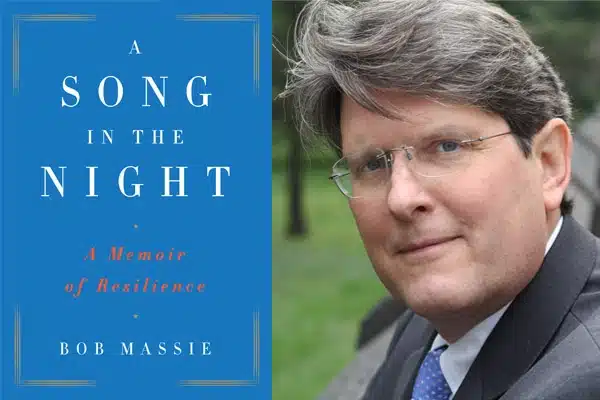Memorial Day with a Memoir
I often think of Memorial Day as a time not only to think of those who died serving our country, but of those veterans from the hemophilia community, who died from HIV, or who are still fighting the good fight, so that our sons could live. Their infections and/or deaths expedited the call to identify the virus that stalked the blood supply, and to find treatment fast.

Bob Massie is one of those. And he’s written about his experiences in a new autobiography called A Song in the Night: A Memoir of Resilience (Doubleday, 287 pages, $24). I urge you to buy it and read it. It’s the newest book in the hemophilia marketplace, and it is a gem.
You may know of Bob from one of several places; he’s a rolling stone, despite his health issues. Episcopal priest, author, researcher, politician, human-rights activist, father of three, nonprofit leader. You may recognize him as one of the people profiled in 2010’s documentary Bad Blood. You also may have met him first like I did, through his parents’ book Journey, from 1973. Journey was truly the first book about hemophilia, told in alternating chapters from the parents, Pulitzer-Prize winner Robert K. Massie and then-wife Suzanne Massie. This stunning book put hemophilia on the map, and revealed painstakingly what it was like in the 1960s and 70s to raise a child with this rare genetic blood disorder.
Bob now shares his own perspective on his life and also continues where Journey left off. Without a shred of self-pity, he shares the searing pain that left him crippled as a child; the loneliness of being left behind and unable to participate in school or playground activities like the other boys. Not surprisingly, but admirably, he turned his suffering into something greater, something that would eventually benefit many. Bob became a crusader against social injustice in its many forms (his influences reached South Africa at one time) and despite his physical limitations, he achieved more than an average person would, without any limitations. His list of accomplishments is stunning, leaving the reader feeling a bit inadequate: if a person who spent years ill in bed could do all this, what’s our excuse?
Bob has excelled in many areas and following a successful lived transplant two years ago, is going stronger than ever as president of a nonprofit, following a year of campaigning for US Senate. Despite spending years in a drug-induced wait for a new liver, watching life pass him by, he is back, strong and focused, and continuing still to make a difference. A Song in the Night is less a memoir of what life did to him, but rather how he has made a life despite so many hardships and setbacks. Bob references his faith often, which has been unshakable and contributed to his desire to overcome his illnesses and in turn, help others.
Like our war veterans, Bob Massie has served on the front lines, earned his battle scars, works to make the world safer and better, and above all, is inspiring. He inspires us, I think, to see the challenges we face, however hard, as perhaps a calling from Above, a way to persevere and then to serve our fellow humans, with love. In one passage of the book, Bob describes his ordination as a deacon. The bishop looked him straight in the eye and told him his responsibility, his mission, was “to serve all people, particularly the
poor, the weak, the sick, and the lonely.” Bob has accomplished all this, and more.
This is a well-written book, full of history, personal narrative and profound inspiration. We should be proud of Bob Massie in our hemophilia community; he has overcome, with his unconquerable soul.

